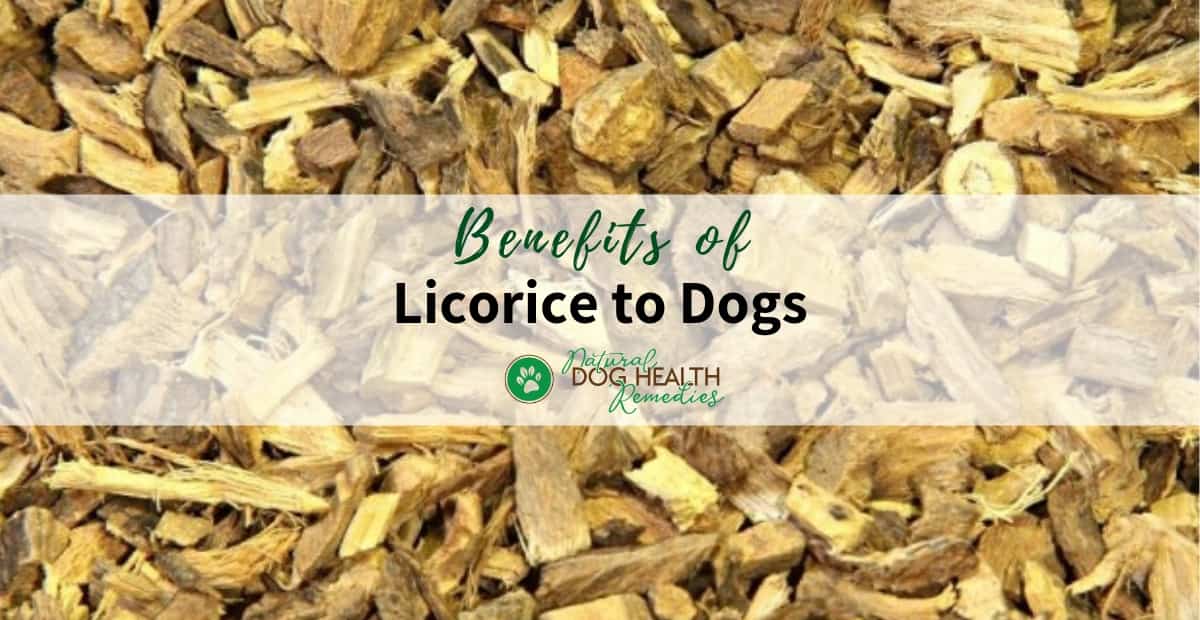Licorice Benefits to Dogs

Overview
Licorice is a relatively safe herb that can be used to help our dogs with various health issues.
Licorice has anti-inflammatory properties and has pain relief and anti-itching properties.
It also lubricates and soothes mucous membranes.
Common Uses with Dogs
Addison's Disease
Since Licorice is an effective anti-inflammatory due to the presence of Glycyrrhizin, which stimulates the adrenals, it is useful for treating Addison's disease in dogs.
Inflammations
Due to its anti-inflammatory functions and corticosteroid-like actions, licorice is effective in helping relieve pain, itching, and inflammation without the side effects that can be brought on by corticosteroids.
If your dog has inflammatory issues, such as arthritis, joint pain, or skin problems such as eczema, or atopic dermatitis, licorice is a good herb to use.
Digestive & Respiratory Issues
This herb also acts on the digestive system by promoting cell growth and alleviating ulcers. Like slippery elm, it soothes and protects mucous membranes and is good for the gastrointestinal and upper respiratory tracts.
For example, licorice benefits dogs with stomach ulcers, and the herb has long been used to alleviate coughs and ease discomfort brought on by bronchitis.
Liver Support
Licorice is also beneficial in treating liver toxicity and preventing many forms of liver disease. In this regard, licorice has liver-protectant qualities similar to those of milk thistle.
To treat or prevent any of the above ailments, the best way is to feed your dog a tincture of the herb.
Topical Use
Because of its anti-inflammatory, antimicrobial and antiarthritic properties, you can also use this herb topically to help dogs with various skin problems, such as eczema, contact dermatitis, and flea allergies. To these ends, use an oil infusion of the herb.

Making a Licorice Oil Infusion
It is easy to make an oil infusion of licorice. Here is how (from Herbs for Pets by G. Tilford):
- In a glass jar, put some chopped dried licorice root and cover it with enough olive oil to leave a 1/2-inch layer of liquid above the herb.
- Cover the jar tightly.
- Put the jar in a warm place away from sunlight.
- Let it sit for one month.
- After a month, strain the oil through a sieve.
The oil can keep for several months if refrigerated.
Safety Precautions
Extreme over-use or prolonged use of licorice may cause adverse side effects. If you intend to use licorice for over 2 weeks, consult a holistic vet.
Licorice can raise sugar levels in blood and should be used with caution in diabetic dogs. Also do not use licorice for dogs with heart disease.
ReferencesJ.A. Duke, The Green Pharmacy Herbal Handbook: Your Comprehensive Reference to the Best Herbs for Healing (Rodale Books, 2000).
R. Kidd, Dr. Kidd's Guide to Herbal Dog Care (Storey Publishing, 2000).
M.L. Wulff-Tilford and G.L. Tilford, Herbs for Pets (Bowtie Press, 1999).





